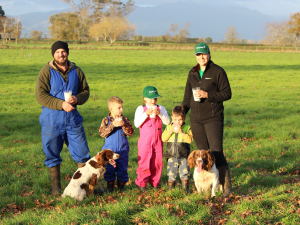DairyNZ Levy Vote Underway as Chair Highlights Seven-Fold Return
Voting has started for the renewal of DairyNZ's milksolids levy.
 : Dairy farmers Nic and Kirsty Verhoek and their children Ferguson, Isabelle and Lachlan raise glasses of milk to toast World Milk Day.
: Dairy farmers Nic and Kirsty Verhoek and their children Ferguson, Isabelle and Lachlan raise glasses of milk to toast World Milk Day.
Tomorrow (June 1) is World Milk Day.
Dairy has long been the powerhouse of the New Zealand economy, significantly contributing to local communities and regional economies, while providing quality and trusted nutrition around the world.
Dairy generated $25.5 billion in export revenue in the year ended April 2024 and provided direct employment for approximately 55,000 people both on and off farm.
DairyNZ and the Dairy Companies Association of New Zealand (DCANZ) are excited to toast these achievements.
“World Milk Day is a great opportunity to celebrate the role of our farmers, dairy companies and the whole sector in progressing a positive future for New Zealand,” says DairyNZ chief executive Campbell Parker.
The international day was established by the Food and Agriculture Organization of the United Nations to recognise the importance of milk as a global food and to celebrate the dairy sector.
“The milk produced by New Zealand farmers is equivalent to two and half serves of dairy per day for 90 million people. This nutritional contribution starts with our farmers’ commitment to their land and animals and flows through the whole value chain to benefit our customers, communities and the country,” Parker says.
DCANZ executive director Kimberly Crewther says the high-quality milk supplied by farmers is being transformed into more than 1500 different dairy products and product formulations, exported to over 130 countries, and providing one in every four dollars New Zealand earns from trade.
“The sector’s success is due to a huge team effort by farmers, dairy company employees and the many partner industries our dairy farms, processors and exporters couldn’t function without,” says Ms Crewther.
Dairy farmers and dairy companies’ contribution to economic activity includes more than $7.9 billion spent on goods and services in the local economy by dairy farmers and $5 billion spent by dairy processors in addition to their purchases of milk from farmers in the year to March 2023.
Dairy farmers are top 10 purchasers of goods and services from over 1/3 of all other industries and dairy processors are top 10 purchasers of goods and services from 1/4 of all other industries.
Crewther says milk is a nutritional powerhouse and a top 5 source of supply of 23 out of 29 essential nutrients within the global food system. This includes 48% of dietary calcium supply and 12% of protein for only 7% of calories. “Dairy products make an important contribution to diets at every stage of life."
Parker says World Milk Day is an opportunity to acknowledge how central dairy can be within communities – with dairy farmers often contributing to local volunteering, education, conservation, mentoring and the emergency services.
“The dairy sector is an industry I find very easy to get out of bed for every day and get excited about, and DairyNZ will continue working hard to ensure Kiwi dairy farmers remain profitable, sustainable and internationally competitive into the future,” Parker says.
Crewther says the dairy sector is a source of a diverse range of careers for New Zealanders, whether it’s farming, advancing dairy science, manufacturing world class dairy products, connecting New Zealand products with global customers through sales and logistics, or one of the many other roles that support the whole sector to run smoothly.
“With our links around the world, there are exciting opportunities on farms, in dairy companies and dairy sector organisations. The sky’s the limit in our dynamic dairy sector.”
Key facts & figures
NZ dairy sector:
Global trade has been thrown into another bout of uncertainty following the overnight ruling by US Supreme Court, striking down President Donald Trump's decision to impose additional tariffs on trading partners.
Controls on the movement of fruit and vegetables in the Auckland suburb of Mt Roskill have been lifted.
Fonterra farmer shareholders and unit holders are in line for another payment in April.
Farmers are being encouraged to take a closer look at the refrigerants running inside their on-farm systems, as international and domestic pressure continues to build on high global warming potential (GWP) 400-series refrigerants.
As expected, Fonterra has lifted its 2025-26 forecast farmgate milk price mid-point to $9.50/kgMS.
Bovonic says a return on investment study has found its automated mastitis detection technology, QuadSense, is delivering financial, labour, and animal-health benefits on New Zealand dairy farms worth an estimated $29,547 per season.

OPINION: Here w go: the election date is set for November 7 and the politicians are out of the gate…
OPINION: ECan data was released a few days ago showing Canterbury farmers have made “giant strides on environmental performance”.